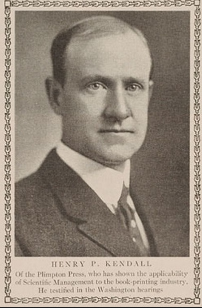- kendall
- plimpton
Basic Information

(Jan 1878–Nov 1959)
Location: Charlestown, Massachusetts
1. Introduction
Henry Plimpton Kendall (January 15, 1878 – November 3, 1959) was a New England entrepreneur, industrialist, and philanthropist from Walpole, Massachusetts. He is considered one of the pioneers of scientific management.[1]
2. Biography
2.1. Early Life
Kendall was born in 1878 in Charlestown, Massachusetts, son of Henry Lucien Kendall en Clara Idella (Plimpton) Kendal. After attending the Lawrenceville School, boarding schools in New Jersey, he graduated from Amherst College in Massachusetts in 1899.[2]
After his graduation in 1899 he started his career at the Plimpton Press company in Norwood, Massachusetts, a company own by his uncle Herbert Mosley Plimpton (1859-1948). He worked his way up from a minor position to general manager and treasurer in 1910. In this period he had grown an interest in the scientific management techniques of Frederick Winslow Taylor, which he had applied in the Plimpton Press plant. This became one of the earliest successful applications of the Taylor system.[2]
2.2. Further Career and Honours
Hendall eventually acquired and founded many textile factories and other companies through his company, the Kendall Company, which emphasized product research and scientific processes.
In 1921-22 Kendall had served as 5h president of the Taylor Society as successor of Henry S. Dennison, and was succeeded by Richard A. Feiss.[3] In 1934 and 1935 he served as Chairman of The Business Council, then known as Business Advisory Council for the United States Department of Commerce.[4]
In the manufacturing village of Slatersville, Rhode Island the Kendall Dean School was named in his honor.
2.3. Personal Life and Death
Kendall was married to Evelyn Louise Way (1893–1979), and they had three children including Henry Way Kendall (1926-1999), who won the Nobel Prize in physics in 1990[5][6], and business executive John Plimpton Kendall.[7]
Kendall was an active philanthropist. He founded the Kendall Foundation, and served on the American Board of Commissioners for Foreign Missions, a Christian mission society. Kendall's property Moose Hill Farm is now an open space for the public.[8]
Kendall died in November 3, 1959 in Sharon, Massachusetts.[9]
3. Work
Kendall eventually acquired and founded many textile factories and other companies through his company, the Kendall Company, which emphasized product research and scientific processes.[10]
His company produced products such as Curity Diapers and Curad finger bandages (those brands are now owned by Covidien). He first turned around the Lewis Manufacturing Company in Walpole and then purchased the manufacturing village of Slatersville, Rhode Island. Kendall Company produced textiles for the government and Red Cross during World War I and expanded throughout the twentieth century acquiring manufacturing facilities in the United States and Mexico.
4. Selected Publications
- James G., Dennison H., Gay E., Kendall H. and Burrit A. (1926), Profit-Sharing and Stock Ownership for Employees, Harper, New York
- Henry B. Elkind (ed.) Preventive management: mental hygiene in industry, with foreword by Henry P. Kendall, 1930.
- Early maps of Carolina and adjoining regions From the Collection of Henry P. Kendall, Boston, Mass. Camden, S.C. 1937
- Henry P Kendall, Special exhibition of the Henry P. Kendall whaling collection at the Pratt school of naval architecture and marine engineering, 1937.
- Henry P. Kendall, The Kendall Company, 50 years of Yankee enterprise!, 1953.
The content is sourced from: https://handwiki.org/wiki/Biography:Henry_P._Kendall
References
- Frederick W. Taylor. "The Gospel of Efficiency," in: The American Magazine, May 1911. p. 108 https://babel.hathitrust.org/cgi/pt?id=mdp.39015056072393;view=2up;seq=114
- John N. Ingham. Biographical Dictionary of American Business Leaders. 1983. p. 701
- Moustafa H. Abdelsamad (ed.) "SAM Diamond anniversary," in: SAM Advanced Management Journal, Vol 53. Nr. 2 Spring 1988. p. 41
- The Business Council, Official website, Background http://www.thebusinesscouncil.org/about/background.aspx
- https://www.nobelprize.org/nobel_prizes/physics/laureates/1990/kendall-autobio.html
- Henry P. Kendall Foundation http://www.kendall.org/
- Henry P. Kendall Foundation: About http://www.kendall.org/about
- Almanac of missions, v. 1906-1921 (American Board of Commissioners for Foreign Missions, 1921) https://books.google.com/books?id=IIgsAAAAYAAJ
- The Kendall Company: 50 Years of Yankee Enterprise by Henry P. Kendall http://www.walpolelibrary.org/walpolenew/history/hpeoplekendall.htm
- Harvard Business School Profile http://www.hbs.edu/leadership/database/leaders/henry_p_kendall.html
